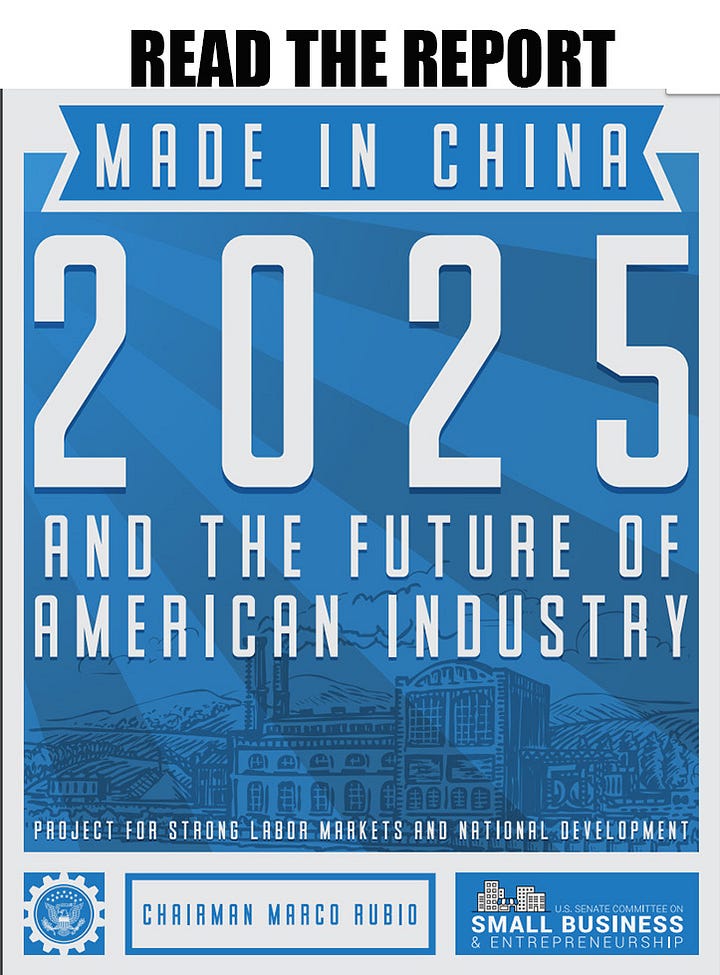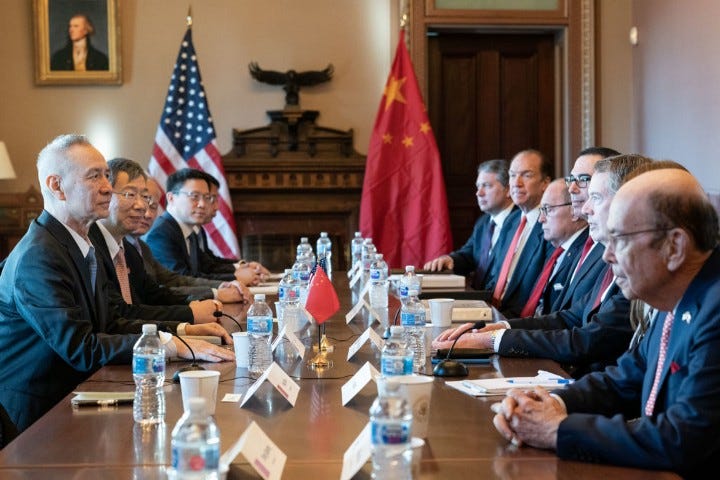Are United States and Chinese Economic Policies Just the Same?

Introduction
On Medium there is a lot of advice given by the writing community to the writing community. Many stories are published about how to be successful, using money as the measure of success. Digging deeper is seen as perfectionism. a fault, an obstacle to success, a function of procrastination.
Frequent advice is to publish a story a day and don’t get hung up on perfection. Continual production is the secret of success. One is encouraged not to think about quality, only about quantity, only about getting your name out there every day so that the public knows you. And as one does so quality will naturally follow, so we are told.

As one who was raised in a business in a home that incorporates a production process, I disagree. My belief is that one should first focus on quality and then quantity. Production whether applied to writing or making ceramics is a process. If one takes the time to understand the quality that one is aiming for, quantity will follow and in a more pleasurable way, but as you shall read in what follows, enjoying one’s work is conceptualized as an obstacle to success. by some ideas afloat in our world today.
In The Cold Mountain Effect Explains Why Incredibly Talented People Struggle to Achieve Their Goals, Jessica Wildfire writes that “Charles Frazier spent almost a decade working on Cold Mountain. According to lore, he couldn’t stop and it was only because a friend intervened that the book was ever published to wild success.”
The implication of the article is that it was fear of success that led Frazier to continually revise Cold Mountain, and that he could have had the same success if he had produced it at a faster rate, perhaps taking only a year to write the book.
Ms. Wildfire fails to incorporate in her thought process that all of Frazier’s books since have a similar period of time between publications, anywhere between nine and twelve years, with the exception of a cook book. Ten years is the natural length of time for Mr Frazier’s internal process to evolve toward completion.
According to Jessica Wildfire’s view, the book would have been just as successful if it had been written in a year. If one accepts Ms. Wildfire’s argument, the end quality of the product has no relationship to the process it takes to get there.
Ms. Wildfire succinctly tells us that Mr, Frazier’s problem is that he loves his work! He enjoys it too much! That is his problem! Think how much more successful he could be if he took only a year to write his books!
“Frazier’s problem was that he was just too good at what he did. He loved doing it too much.…..
…Someone can know too much. They can be too talented. They’ll turn any project into an epic journey through the Himalayas. They don’t get tired of working. They don’t want to see the end. They’re not even perfectionists. They just love their work too much.” Jessica Wildfire, The Cold Mountain Effect Explains Why Incredibly Talented People Struggle to Achieve Their Goals
OK! That seems to be a prevalent view in contemporary culture, We see it in State economic development policies where a “quality job” is defined solely as a job that pays higher than average wages and benefits. The goal of work is to get paid, not something intrinsic to the work process itself. The worker could hate every minute of his life on the job but if he makes more money at it than most, he has a quality job and is not one of those losers hung up on enjoying their work!
The measure of “innovation” in the bureaucratic state is also entirely focused on the product and not the process. I submit that it is not the role of American government to produce products for the commercial market, it is a more American role of government to encourage an environment where an innovative process can unfold. Whether that is appropriately American is up for debate but it would be a turn in the right direction, in my opinion, and that is what we must do in these times- roll our direction back to the American Idea.
America is an idea. Ireland is a great country, but it’s not an idea. Great Britain is a great country, but it’s not an idea. That’s how we see you around the world, as one of the greatest ideas in human history. Bono
I spent several weeks navigating the SBIR.STTR grant support system as an uninvited outsider, deemed at the outset as not qualified to receive system support. The seemingly general assumption is that the applicant will accept the adjudication from the first support organization and be done with it. I, however, decided to proceed to see if I could find an open door where I could apply on my own. Eventually through persistence I returned to my original starting point and this time passed through the door to have confirmed what I had already concluded.

The SBIR STTR grant program is a civilian economic development program embedded in a national defense act. Perhaps that is what it took to get the national defense act passed or maybe packing civilian policy into a national defense act gives it cover as an enumerated federal power.
About Me
I am an American citizen, female, small businesses person, and independent citizen-researcher on government economic development policy.
My family business was established by my parents on the rural coast of Maine as a business in a home in the 1950’s, an era when the United States had a strong middle class and the free enterprise system reigned.

The core of our business is a research and development, designing original ceramic glaze and body recipes, as well as all of the ceramic forms. Our business produces and markets products, wholesale and retail. The whole of our business spans the three phases of the SBIR grants as a complete system that begins with research and development, produces a product and follows it through to the marketplace.
The Evolution of the Morrill Act
My first encounter with the support system for the SBIR grants was through the Maine Center for Entrepreneurs.in partnership with the Maine Technology Institute, a public non-profit charity with a for-profit board, assigned by the Maine Legislature to be the singular gatekeeper for SBIR/STTR grants.
All channels I went through in my journey of seeking an application venue for the SBIR grant referred back to MTI, described by one consultant as having “taken the SBIR grants under its wing” in the manner of speaking in systemic code that uses the term “angel investors” to mean “high growth investors”.
The board of MTI is authorized to make a profit and to own intellectual property rights, When I eventually brought up this statutory fact to the MTI SBIR consultant, she adamantly denied that MTI seeks ownership of intellectual property, but she is only a consultant whose purpose is to process the SBIR grant applications, how would she know what goes on behind the closed doors where the public-private negotiations of the parent company she works for take place?
It’s not only that the board of MTI is enabled to make a profit and own intellectual property rights, but MTI is closely tied to the University of Maine, which has its own intellectual property ownership claims in place which I covered in How The Morrill Act Gave Birth to Public Ownership of Private Intellectual Property in the USA,
Title 5: ADMINISTRATIVE PROCEDURES AND SERVICES
Part 19: RESEARCH AND DEVELOPMENT
Chapter 407: RESEARCH AND DEVELOPMENT
Subchapter 1: MAINE TECHNOLOGY INSTITUTEE.
E. A program in collaboration with the University of Maine School of Law to support the commercialization and manufacturing of innovations in the State by providing education and assistance with the patent process of the United States Patent and Trademark Office to companies, inventors and entrepreneurs in the State. The administrative costs of a program under this paragraph are not management and related operating costs of the institute under section 15305. [PL 2017, c. 109, §4 (NEW).] (emphasis mine)
In 1999, §1921. Maine Patent Program was enacted as an educational program on patenting. The University of Maine claims that it can charge “a reasonable percentage of the royalties for any successful innovation patented through the program for services provided in registering a patent.” You can read more about this in the story on the Morrill Act. previously mentioned.
I have become aware that systemic language is intentionally used to convey an impression to the uninitiated while communicating another meaning that is implicitly understood to the cognizant. In this case, the core practicing policy of the SBIR/STTR grant system could have been explained up front but was never stated by anyone in so many words until I got through the inner door.
At one point it is stated in writing on the SBIR website, under the heading “Solicitations” that no unsolicited projects are accepted, but that is the only instance where I found the actual practicing policy stated, before passing through the gates of the inner support system.
Solicitations
You must respond to a funding solicitation from a particular agency, because the SBIR/STTR programs do not accept “unsolicited” proposals (a proposal that does not address a topic specified in a currently open agency SBIR/STTR solicitation). …. (emphasis mine)
The policy in practice is a direct contradiction of the words of the SBIR/STTR Policy Directive, specifically stating that the solicitations are not intended to be a substitute for unsolicited proposals.
(3) SBA does not intend that the SBIR/STTR Program Solicitation replace or be used as a substitute for unsolicited proposals for R/R&D awards to SBCs. In addition, the 83 SBIR/STTR Program Solicitation procedures do not prohibit other agency R/R&D actions with SBCs that are carried on in accordance with applicable statutory or regulatory authorizations. (emphasis mine)
In practice, there is a bulldozer psychology implementing a policy that enforces its own laws, inconsistent with the statutory policy and the USDA SBIR website literature. As a government institution making its own rules the SBIR/STTR grant program would qualify as a shadow government were it not for the fact that it is the consistent practiced policy, relegating its own enabling legislation to the shadow realm, hidden in the mists into which the Founder’s USA is receding.
When one explores the USDA SBIR website one encounters a long list of federal solicitations, too long and complex for most to navigate on their own, and so for that purpose there needs to be a support system of specialists to guide the applicant through.
What I could not find on the website was any place where one can submit an application for an unsolicited project related to the SBIR grants as it is presented in the online literature and in the enacting legislation.
The first response I encountered on my journey was to be told that the Maine Center for Entrepreneurs questions if our business qualifies as a rural business, having only been a rural business located in Maine for sixty-eight years.
In retrospect, I understand this statement meant that MCE questions if we would fit in with the federal governments solicitations. When I finally had an opportunity to meet with the MCI consultant, it was confirmed that the singular function of the support system is to match the applicant to a federal solicitation. The counselor justified this system by saying the solicitations are very broad categories but that does not change the fact that the system is functioning exclusively in service of the federal government’s purpose, as a function of a command economy which is ideologically opposite that of a free enterprise economy, the one is top down central management, and the other functions through the inner complexities of a relational world.
The phrase “relational world view” just popped into my head as I was writing. I looked it up, thinking it must be a specific term for a general concept but found that it is a specific term defined in the context of tribal cultures, as if a culture as large as the United States could not also be relational. It was likewise thought, at the time of the Founding Fathers, that a Democratic Republic couldn’t work in a geographical expanse as large as the thirteen colonies.
At the roots economy there is spoken a different language than that used by the centrally managed economy, as if each is a separate nation having its own separate language.
The next step after entering through the front door of State support services, is speaking with Mr. Elrod at the federal level. Since I was denied support at the outset, by the time I finally met the MTI consultant I had already been there, done that, and been dismissed without my scheduled phone interview, given the reason that Mr. Elrod read the one page abstract I submitted and decreed that our project was not particularly innovative.

Ditto. I do not find the economic development bureaucracy innovative at all. It is a bureaucracy that defines innovation vertically as next generation technology products while the bureaucracy itself and its concepts of what advances innovation are stuck in a rut. The top down system imposes a rigid set of rules over process development, be it research and development or economic development. By using the proposed end product as the measure of qualification for a publicly funded system, the system functions as a product development corporation. Product development is an improper object of government, as I understand it in the words of James Madison,
The diversity in the faculties of men, from which the rights of property originate, is not less an insuperable obstacle to a uniformity of interests. The protection of these faculties is the first object of government. From the protection of different and unequal faculties of acquiring property, the possession of different degrees and kinds of property immediately results; and from the influence of these on the sentiments and views of the respective proprietors, ensues a division of the society into different interests and parties.
Those words place the people before the government. The government serves the interests of the people and not the other way around. A Constitution built on the premise of individual liberty and freedom supports growth from the roots up. If the federal government is involved in economic development it should be limited to furthering an environment that supports the realization of individualized potential.
The federal government should be like the wave function is to the particle. The wave function is a full of probabilities, not actualities. The particle is the actuality but the system that measures the particle must be set up in a way that excludes the measure of probabilities.
Innovation occurs as an outcome of process, just as Mr. Frazier's novels are the end result of a process that spans a decade. Mandating an end product is the equivalency of conducting a scientific experiment to reach a predetermined conclusion. The scientific process, conducted properly leads to its own conclusions (products). Imagine if Planck were solving a mathematical problem to arrive at a predetermined conclusion. Would the quantum domain have been discovered, or would the conclusion that led to its discovery have been discarded as noncompliant? Planck was open minded enough to accept that the results of his mathematics led to an interpretation of nature that he could never have imagined.
There is much talk, and money going to government and private non-profit programs for economic development. One can easily become seduced by this illusion into believing that the system actually cares about economic development in a way that is inclusive of all. But it doesn’t. The system cares only about its own self interest.
A person working within the system may have such a capacity to think innovatively about solving individualized problems but it is not part of their job description to do so. Their job description is limited to jobs performed by rote, such as matching up projects to government solicitations, placing cubes in square holes, or so it appears from my perspective of interacting with it on the basis of an individual business with individualized needs.
In all I met with five consultants, explored the website, and read relevant parts of the federal act and associated guide book. Throughout I was told that qualifying projects must be very risky and world changing, only for superstars extraordinaire.
Contrarily the SBIR/STTR Policy Directive defines innovation inclusively as
(t) Innovation. Something new or improved, having marketable potential, that includes the development of new technology, the refinement of existing technology, or the development of new applications for existing technology.
The federal act and the directive published in association with the federal act represents the proper measure of the program, as enacted. That doesn’t change the fact of how the act functions in practice.

I approached the grants believing what is stated on the website and the SBIR/STTR Policy Directive, but I soon realized that the act itself is conflicted.
The ideologically conflicting core of the act is between purpose (2) and purpose (3) as stated in the following paragraph:
© The statutory purpose of the SBIR program is to strengthen the role of innovative SBCs in Federally-funded research or research and development (R/R&D). Specific program purposes are to: (1) stimulate technological innovation; (2) use small business to meet Federal R/R&D needs; (3) foster and encourage participation by socially and economically disadvantaged SBCs (SDBs), and by women-owned SBCs (WOSBs), in technological innovation; and, (4) increase private sector commercialization of innovations derived from Federal R/R&D, thereby increasing competition, productivity and economic growth.
Purpose (2) implicates that the program is driven by the needs of the federal government acting in the manner of a corporation pursuing its own agenda, and (3) allows room for a individualistically-determined free enterprise system, where the government serves the interest of the people with an intent to be inclusive
Our business is women owned, rurally located, in a non-agricultural business. Although the USDA SBIR website states that one need not be in an agricultural business, I found no support dedicated to non-agricultural businesses.
Although the SBIR website says it encourages women owned businesses, the local women business center knew nothing about SBIR grants and referred us back to State central management. Nor did I find any support for women owned businesses on the USDA or SBIR website.
I would argue all free enterprise micro economy businesses are economically disadvantaged in a wealth redistribution economy that favors large corporations and non-profits, but that is another topic.
In the US Senate Committee on Small Business and Entrepreneurship Report, Made in China, 2025, and the Future of American Business, industries are designated to either the developed or developing world. Certain industries, targeted by China, are classified as of major importance to the US economy.

The reason we are told that we should be concerned about China’s move toward economic dominance is because China is an increasingly oppressive totalitarian state, but if one compares what is written in the Senate report about a merging of the government and private sector in China with the entrenchment of the command economy in the USA, one is forced to consider how far the United States has slid down the slippery slope to the point that our government operates identically to the way that China’s government is described in the following paragraph of the Senate report.
Compare:
Reported to have been expressed by Wang Xiaochuan, the CEO of a Chinese search engine company. We’re entering an era in which we’ll be fused together. It might be that there will be a request to establish a Party committee within your company, or that you should let state investors take a stake, you know, as a form of mixed ownership. If you think clearly about this, you really can resonate together with the state. You can receive massive support. But if it’s your nature to want to go your own way, to think that your interests differ from what the state is advocating, then you’ll probably find that things are painful, more painful than in the past.” Made in China, 2025, and the Future of American Business. pg 39.

How is the direction in which China is moving different from federal solicitations used to marginalize a free enterprise driven economy by awarding SBIR STTR grants exclusively to projects that align with the interests of the state?
The fusing together of the private and public, for-profit and non-profit sectors into one centrally managed system that recognizes nothing outside of it's self is already codified into law in Maine.
(2) use small business to meet Federal R/R&D needs; (3) foster and encourage participation by socially and economically disadvantaged SBCs (SDBs), and by women-owned SBCs (WOSBs), in technological innovation.
In practice the SBIR/STTR legislation, should be practiced as inclusive of purpose (3) by providing specific support for economically disadvantaged SBCs (SDBs), and by women-owned SBCs (WOSBs).
The United States needs to reconsider the federal government’s role in economic development, including where national defense policy ends and civilian policy begins. Since the seventies “merge” has been the name of the game, merging the public with the private, for-profits into the non-profits, the defense department into civilian policy. They call it innovation but in practice it is totalitarianism, a one way street. Innovation from the top down, only.
There is no longer a separation of powers among the economic sectors of public, private, and non-profit.
America is an idea, but it may have moved on to other parts of the world. It’s not too late to call it back to its place of origin. We must ask ourselves is it true that all power is exclusively economic? Do we to have to compete with China? If we must compete with China, must it be on China’s terms? Is there still power in an idea? How powerful can an idea be?
Comments
Post a Comment